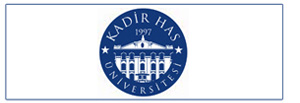|

|
 |
|
|
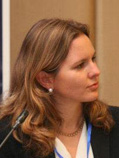 Diba Nigâr Göksel |
|
In this issue of TPQ, we explore the different factors affecting a push and pull of forces between East and West, as experienced on Europe’s periphery. Besides dissecting schisms between East and West, we also examine the ongoing integration between them – through migration, economic interdependence, intellectual exchange, and other consequences of globalization.
Contributors to this issue reflect on questions faced on Europe’s east, such as: Is “balancing” foreign policy orientations inevitable, given the trend towards multiple power centers? Is the Eurasian Union a viable alternative to EU integration? Can Turkey aid in the Europeanization of the region despite the stall of its EU accession process? We look particularly closely at Georgia and Ukraine – key players in the balance of power in the EU’s eastern neighborhood.
Challenges emanating from the Middle East are also covered through various perspectives in this issue of TPQ. Some of the related questions we probe are: Does Turkey have the capacity to step up to a constructive regional leadership role? Is the intensification of Ankara's collaboration with Western allies driven only by pragmatic, short-term considerations or is there a long-term shared vision? For the sake of stability in the Middle East, will the benchmarks of democracy that Turkey has aspired to be lowered? As it prioritizes the containment of Iran, is Washington enabling the empowerment of Sunni networks that could turn against the West?

|
|
|
 |
|
|
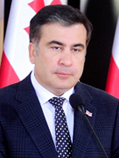 Mikheil Saakashvili |
|
"Georgia was maybe the best case of Turkey's famous policy of 'zero problems with neighbors'. This relationship is vital for Georgia, but also crucial for Europe in general. It allows the South Caucasus to become an East-West corridor. It offers Europeans an alternative road to Asia and it divides the North-South axis that is creating well-known problems for world stability and for Western interests."
"Any perception of European or American withdrawal from our region would empower the forces that oppose democracy and freedom."
"Turkey has become an active proponent of Georgia's integration with NATO. The usual question of NATO enlargement skeptics regarding Georgia was 'who will defend Georgia? Which country will be the frontline support?' In the Baltic case it was Poland. Now in the case of Georgia, Turks are proactively saying, 'this is us.'"
"My vision is simple: we need to turn an arc of crisis into an area of cooperation. The problem is that this vision is not shared by everybody, especially in Moscow..."

|
|
|
 |
|
|
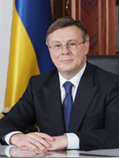 Leonid Kozhara |
|
"In 2013 Ukraine holds the OSCE chairmanship. Ukraine considers this role as an important opportunity to make a solid contribution to strengthening security and promoting stability from Vancouver to Vladivostok."
"NATO's future relevance for maintaining transatlantic security relations is far from clear. Today, the Alliance is definitely going through the most challenging period of adjustment since its foundation."
"European integration remains both the main impetus and pattern for the current political and economic transformations in Ukraine. This process is painful and uncertain in terms of time framing, but it is one of the important means to modernize the country."
"The Third Eastern Partnership Summit in Vilnius (28-29 November 2013) should be marked with several important deliverables paving the way to further progressive development of EU's engagement in the region of Eastern Europe."

|
|
|
 |
|
|
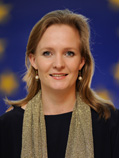 Marietje Schaake |
|
"The ball is in Turkey's court. It is yet to be seen how dedicated to its EU bid the government of Turkey is."
"Today, relations between the EU and Turkey are more based on shared concerns in the Middle East than on shared values or on the accession negotiations."
"If seen as aligned with the Sunni half of the Middle East, Turkey's credibility as an independent regional broker will effectively end."

|
|
|
 |
|
|
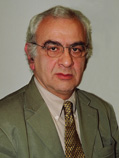 Gerard J. Libaridian |
|
"Erdoğan and the AKP could have denounced the past treatment of Armenians outright (…) by rejecting the extremist policies of the wartime CUP government, as inimical to Islamic values."
"An Ottoman Empire, however reduced in size, or Republican Turkey would have to have been a liberal and democratic state had Armenians and other ethnic groups been part of its population."
"Erdoğan thinks history is important to Turks and Turkey, and it is so in a way that he can pick and choose which events should be remembered. Conversely, he does not think history should also be important to Armenians."

|
|
|
 |
|
|
 Igor Okunev |
|
"Failing to accept Russia, Turkey, and Israel as equal partners of the West and its outposts in advancing Western values, Europe shrank back to the mental frontiers of the Middle Age."
"It is the new Western values, as well as the failure to understand or accept them in Russia, that have laid the groundwork for a new longer stage of the shifting of geopolitical code."

|
|
|
 |
|
|
 Farid Mirbagheri |
|
"Together with Sunni Saudi Arabia's countering policies to minimize Shiite influence, the policies of the Iranian establishment are a stark reminder that sectarianism is far from over in the Middle East."
"There is no guarantee that the U.S. military strike could permanently paralyze Iranian nuclear infrastructure. It would only postpone it, probably for several years; and then what?"

|
|
|
 |
|
|
 Halil Karaveli |
|
"Turkey has committed itself to bringing down the Syrian regime, and recent statements from the U.S. administration are sure to have strengthened Ankara's resolve."
"It is safe to assume that the prospect of the Muslim Brotherhood, an ideological kin to the AKP, ascending to power in Syria excites the ruling Sunni conservatives of Turkey."

|
|
|
 |
|
|

Anna Borshchevskaya |
|
"Although many Armenians see Russia as a protector, choosing Russia would push Armenia down a declining path and undermine Western security interests."
"As Brussels and Moscow are both pressuring Armenia, Sargsyan will have to make such a choice soon."

|
|
|
 |
|
|
 Hovhannes Nikoghosyan |
|
"Russia (and China – more mildly) blamed the NATO forces for abusing the UNSC Res 1973 in Libya and in fact engaging into 'regime change' operation through direct support of the rebel forces."
"Any foreign intervention into Syria, without proper UNSC mandate, will result in much worse than the U.S.-Russian standoff in Pristina airport in 1999."

|
|
|
 |
|
|
 Didem Collinsworth |
|
"Hatay had Turkey's second highest provincial level of exports to Syria after Istanbul, underlining its role as Turkey's trade transit route to the south."
"Syrians living outside the camps are increasingly seeking jobs as they run out of money and are willing to work for up to 50 percent less than locals."

|
|
|
 |
|
|
 Tuba Eldem |
|
"The open-ended nature of accession negotiations and the lack of a firm date for Turkey's accession to the EU were perceived as strong evidence of European double-standards against Turkey."
"Erdoğan's recent statements about upgrading Turkey's status to full SCO membership imply a shift from Turkey's traditional Western-aligned foreign and security policy to a Eurasian-focused one."

|
|
|
 |
|
|
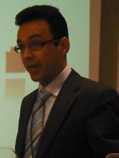 Sotiris Serbos |
|
"While the West is adapting to new representation dynamics in global governance, the developing countries should learn to act as responsible leaders in global undertakings and not merely remain as regional powers."
"In the era of globalization, we are witnessing a more liberalized Turkish state, which will become increasingly sensitive to market forces."

|
|
|
 |
|
|
 Lisel Hintz |
|
"The policies prescribed by 'Islamist Ottoman-nationalism' are not only provoking immense contestation within Turkey, but are currently the biggest threat to Turkey's EU membership."

|
|
|
 |
|
|
 Seçil Paçacı Elitok |
|
"The need to prevent illegal migration, provide support to the victims of human trafficking, and deal with asylum seekers forced Ankara to develop a new policy over the course of 2000s."

|
|
|
 |
|
|
 Deniz Sert
|
|
"It is clear that the existence of more than one agency, which is responsible for providing security and passport checks at border crossings, and for supervising the borders of the country, makes inter-institutional collaboration rather difficult."

|
|
|
 |
|
|
 O. Can Ünver |
|
"From the 1980s onwards, Ankara discovered the necessity of establishing a proximity to its citizens and former citizens, who had become permanent settlers in the migrant receiving countries."

|
|
|
|
Premium Sponsor of This Issue
|
| |
 |
|
Address: Kadir Has Üniversitesi Cibali Kampüsü Sosyal Sorumluluk Binası ( Beyaz Ev )
Küçük Mustafa Paşa Mah. Seferikoz Sok. No:14 Kat.1 Fatih- İstanbul
Phone: +90 212 621 4442 - +90 212 621 9258 Fax: +90 212 531 8718 info@turkishpolicy.com
|
|


